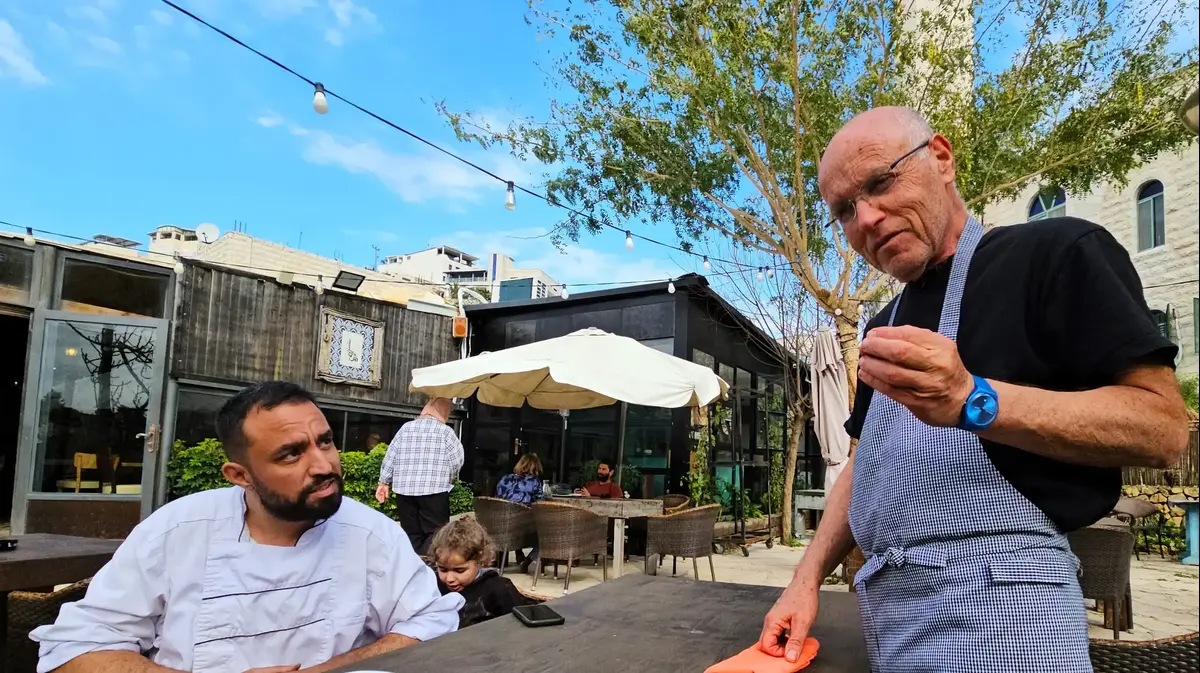This week, on November 30, a ceremony was held at the President's House to mark the anniversary of the departure and deportation of Jews from Arab countries and Islam.
To me, at least, this is an extremely important day.
It is even more important that he not only remains today of protocol and official ceremonies, but will also succeed in penetrating the education system, the consciousness and the story we tell ourselves about Israel and the Israelis we are.
I had the privilege of leading the ceremony, and from the responses I received, I thought it appropriate to share here some of the things I said there:
Here, it can happen in any home.
Every day.
Suddenly my teenage daughter twists her nose.
She does not want to wear this coat.
Or it's that bag she suddenly does not like.
Why, we ask, rather beautiful.
And fairly new.
Then she says it makes her look like a chahla.
Like what?
"Like a chahla."
It takes me a moment, but I understand that I have to leave all occupations now and go on a homeschooling hour.
Unpleasant and not cool, but every parent must occasionally dig into their children.
A few things need to be explained.
For example, that Chahala is not a derogatory name.
Just as my parents explained to me when I suddenly pulled out the nickname "flower", which functioned on a similar standard in the previous generation.
Chahla and Farha are not derogatory names, and they must not sound like that to us.
By the way, the same can be said about Zalman pants.
Or on a restaurant from Sderot.
Chahla and Farha are names of beloved grandmothers, who were once beautiful young girls, just like you, my daughter.
And with similar dreams, or not.
And are part of the list of heroines and heroes of Shivat Zion.
They went up or were expelled, or both, but one thing is certain: Chahla and Farha did not relocate.
They did not sell the apartment or rent the store.
Their communities were not compensated for the synagogues and schools, the clubs and the orphanages and the community.
On the way home they had no idea yet what they had left behind.
It always amounted to much more than one might have guessed.
And the fact that they grew up in Morocco, Iraq or Kurdistan should not dwarf the story of their aliyah.
And I tell this little story, because I believe that one of the things that must urgently change in the Israeli narrative is the assumption of many of us that unlike the pioneers and builders of the land, the Eastern Jews were "brought."
That is, do them a favor.
Take them out of the wilderness of nothingness and endless backwardness, so they must mumble gratitude and never come up with complaints.
The truth is that the Jews of Asia and North Africa brought themselves.
They brought everything they had with love and dedication, and when the same former pilot at the Balfour demonstrations slapped the policewoman "I brought you from Ethiopia", not only Ethiopians felt how crooked and how familiar the distorted logic is.
• • •
My dad has never been as talkative as I am.
Mainly because he worked as a glassblower, and almost always had some kind of pipe in his mouth.
More than once we asked him to tell about the battles he took part in, but he did not agree to say even a word.
The only battlefield story he liked to tell over and over again was the little story about the conquest of Quneitra in 1967.
An IDF armored force passed on the main and narrow street of the Syrian town, but as a result of an intelligence malfunction, all Quneitra women were convinced it was a victory procession of the Syrian army itself.
At one point one of the women began to doubt the quality of the intelligence that flooded the Quneitra balconies.
Suddenly this whole thing did not seem so to her.
And she turned from the porch to the guy who stood half-body above the turret and asked him nicely:
"Say, you're Syrian, right?"
"No. I am Iraqi," the soldier replied.
And yes, my dad was able to tell this story countless times, each time laughing anew to tears.
He deeply believed that no matter how small this story was, it contained quite a bit.
• • •
Immediately after the Balfour Declaration was published, a young Jerusalemite named Ashriko Mizrahi stood up and embroidered the words of the declaration on a veil of an ark.
The shape of the lamp is embroidered.
As the psalm chapter "To the Musician Conductor" is sketched.
Equally interesting is the fact that he did not do so in Jerusalem, his hometown, but in Tunisia, where he had moved a few years earlier in order to evade conscription into the Turkish army.
Which Mizrahi knew how to embroider, but he was mainly a musician and poet, a music teacher and a radio star in the capital city of Tunis.
He wrote about 200 songs in Hebrew, but wrote even more in Arabic.
Mizrahi was probably the greatest bard of the 20th century, and the most Zionist of all.
In his hit "Habibi" - and only a Spanish poet is able to address Kadosh Baruch he with the title "Ya Habibi" - he writes "We will return to mark our holy city and rule it with a high hand", and he also wrote this as a familiar figure in the heart of Tunisia's Arab environment.
At the end of the ceremony, a tall man who had known my family since Tunisia approached me. He stuck a finger under my shoulder, as is the custom of Jews who have a story to add, and he wondered how I did not tell about the show at Hebei. Tunisia, Hebei, very much liked the music of Asher Mizrahi, but once he invited him to perform at the palace on a troubled date.
It was the evening of Tisha B'Av.
Asher Mizrahi knew it was not a matter of refusing, so he simply arrived with a large ensemble of musicians and performed an entire concert of lamentations of T. Bab, in front of the entire royal court.
On such stories I tend to say that I really do not care how much truth there is in them).
• • •
And this story, too, is almost never told: sometime, shortly before the establishment of the state and shortly after, the Jewish Agency published small, thin booklets of poems, and distributed them as best it could throughout the Jewish world.
In those days it was believed that songs, especially agency songs, could change the world, or at least the person.
Indeed, without social networks and without YouTube, everyone learned pretty quickly to sing "Here's what's good and what's pleasant" and "We came to this country."
But there were some places in the world, especially in Arab countries, where the rabbis received the songs and had no doubt - these are scriptures that have their place in synagogues.
It was as clear to them as the sun.
After all, they are written in Hebrew, and they are imbued with the love of the land and the love of Israel.
What else is needed for something to be considered sacred?
I, personally, knew old immigrants who sat in the synagogue and sang Alterman's 'Noma Emek', and on Simchat Torah they danced with the books and sang "Red night, our great rabbi who bursts into the sky."
It is also important to tell these stories on this day: about communities for which Zionism was never considered a revolution, and certainly not an opposition to tradition.
For the price they paid for this deep view.
And about us, that we kind of missed the version that those sages and sages offered to the Jewish story.
shishabat@israelhayom.co.il
Were we wrong?
Fixed!
If you found an error in the article, we'll be happy for you to share it with us





/cloudfront-eu-central-1.images.arcpublishing.com/prisa/PLYA4LBPKSCNW2IW2722QJMDVA.jpg)









